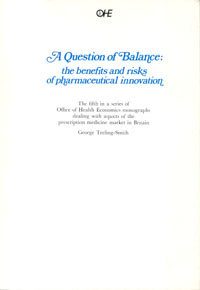Since this monograph was completed, two new stories concerning the safety of medicines have been featured prominently in the British press. The first has been on…
Since this monograph was completed, two new stories concerning the safety of medicines have been featured prominently in the British press. The first has been on an American legal case in which damages have been awarded because a medicine taken during pregnancy was…
Since this monograph was completed, two new stories concerning the safety of medicines have been featured prominently in the British press. The first has been on an American legal case in which damages have been awarded because a medicine taken during pregnancy was alleged to have caused congenital malformations. The second has been based on the fact that the benzodiazepines, when taken for prolonged periods in high dosage, may carry the risk of causing dependency. Although this monograph was written too early to discuss either of these allegations each of them highlights the conclusions to be drawn from it. First, no medicine is free of all risks, although the existence and extent of these risks is often highly debatable. Second, more centrally, these risks need to be seen in perspective against the benefits. For the benzodiazepines in particular, their enormous advantages and safety in comparison to those of earlier alternatives are fully discussed in the monograph and remain unquestionable. Their risks of causing dependence have been officially stated to be small; and any harm which benzodiazepine dependence may cause must be judged not only against the dangers of the barbiturates but also, for example, against the hugely greater risks of dependence and social catastrophe still arising from the excessive consumption of alcohol.
Disproportionate emphasis on the risks of medicines can itself be extremely harmful. It can not only deny their own specific benefits to patients in need; more importantly it can slow down the whole pace of therapeutic progress.
Thirdly, these two new stories emphasise the importance of taking all possible steps to minimise the risk from the use of medicines. The monograph discusses the measures which have already been taken in this connection and those which are at present under discussion.
Here, cost as well as administrative complexities have to be set against whatever real benefits can be expected in terms of safety. There are no easy answers, despite the often simplistic terms in which such problems are discussed.
Finally, every new pharmaceutical ‘scare’ story underlines the importance of careful prescribing. The monograph describes the evidence that doctors have become considerably more cautious in their adoption of new medicines since the original thalidomide tragedy. Nevertheless; careful prescribing must not be equated to therapeutic nihilism. Once again the enormous benefits of medication which are described in this booklet have to be remembered. All in all, these two recent allegations of the dangers of medicines in no way detract from the conclusions of this monograph They serve to underline the fact that the assessment of the benefits and risks of medicines is essentially a question of balance — and if we are not careful that balance is in serious danger of being swung too far against the development of those future new medicines which are needed to extend the dramatic therapeutic progress which has already been achieved in the past 30 years.
